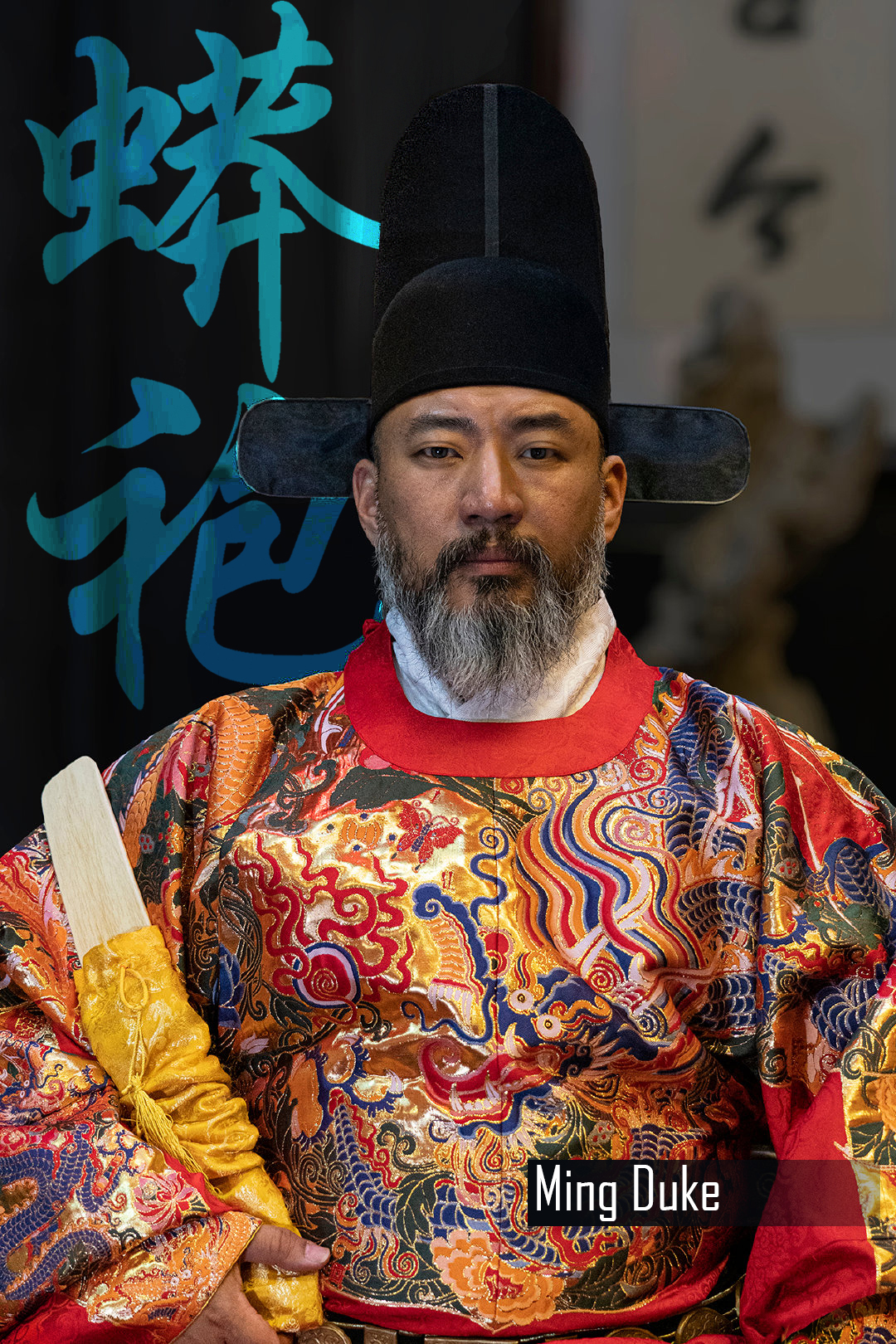These were some of the heaviest cavalry fielded by the Vietnamese 陳
Trần dynasty which resisted the three massive
Mongol invasions.
He wears a distinctive ornate bronze helmet which covers his entire head save his eyes, a scale cuirass with iron padded chestplates and armed with Pole-arm « Great Breach Knife - Giáo-Đao or Phác-Đao - 撲 刀» and a longsword. He also carries a «cái khiên» lacquered shield made of wood, and reinforced with a rattan edge and bindings. The surface is lacquered black with inset decoration of silver foil.
Thank you to my Patrons who has contributed $10 and above:
You helped make this happen!
➢ ☯ José Luis Fernández-Blanco
➢ ☯ Stephen D Rynerson
➢ ☯ Michael Lam
➢ ☯ SRS (Mr. U)










Comments
But I think the affairs of the north, the east and the west always kept its eyes to the north and the east with Korea. The Korean kingdoms and the various Khaganates always caused problems so it was paramount to counter them, and if you remember, Tang always tried to micromanage and meddle with the Korean kingdoms while expanded deep into the west while repelling the northern steppe barbarians. Plus, for the majority of the history of the first millennium southern China was pretty peaceful (and could easily be put down if there's a rebellion)
1) A lot of the time, the Chinese Empire was mired internal problems, e.g. famine, succession crises, civil wars
2) Logistically, even if you can conquer more land, you have to station troops there to guard it and send settlers to sinicize it. This called for resources the empire simply didn't have
3) Financially, as the British Empire found out, sometimes having more colonies actually cost you more money then what you can gain
An example of what I a talking about is Richard the Lion Heart never took Jerusalem even though he had defeated Saladin at the time and there was no army strong enough to stop him. He knew that if he had conquered the city, he would have to stay the rest of his life to guard it. Similarly, in the Ming Dynasty, Admiral Zheng He commanded the biggest navy in the world, housing 30000 troops as he got all the way to East Africa. He could have easily taken those land, but guarding and administering them would have been a nightmare. The Chinese Empire's main threat were the nomads from the North, hence the fleet was not maintained and most of the money went to maintaining the Great Wall.
A final example is the Roman Empire, the Western counter part to the Chinese Empire. It eventually split in half despite the fact that it was no longer expanding. It just made more administrative sense to govern it from two capitals. And even that solution couldn't prevent the empire from eventually collapsing under its own weight. And the same logic can be applied to the Russian Empire and Ottoman Empire - sometimes less is more.
Now- on an off topic point, this actually has some benefits, it created almost a papal- like system of interwoven "East Asian political" scene, where if a tributary vassal state was invaded or had its family displaced by a coup, it would provoke a response from China (a Kingmaker role.) And there is some argument that overall it created a more stable system compared to Western European politics, where peace lasts over 200 years but its kind of beyond the topic.
On the subject of conservatism, and regional isolationism, I do think Confucianism has a positive and stabilizing effect over all (not social- as in women but in a geopolitical sense) since big wars are much rarer compared to Europe and the Americas. The total wars between China and Korea/ Vietnam could be counted with hands alone, and lets not forget that no native Chinese dynasty ever invaded Japan (Kublai being foreign of course)
For instance- China secures its economy and its brands by economic nationalism, high tariffs and support for its native tech companies, China muscled its territorial claims through showing off its navy and deploying troops on contested boarders. All of it was still not war. It's military power and bullying chest pounding, but still not divorced from what a conservative who advocate for strong boarders, national defense and native- first policy would do. I don't necessarily agree with it, just to point out the technicalities.
Well, since we got to talk about politics I think I should state a bit of myself. I consider myself a centrist, left- leaning but very disillusioned from an American POV. For my love of history I would freely admit I am a conservative in terms of academics and practical policies. If I lived in Europe I'd probably be a conservative in both Germany and Sweden. For China I'd be a left leaning centrist with a strong attachment to traditional culture (mainly because its been bleached by the last 50 years.)
Btw: I actually write about Ruism, I have a book coming out soon about the Warring States and the formation of the Chinese consciousness.
I look forward to your books, where can I get a copy?
My advocacy of Legalism is simply based on the fact that it worked for Qin, why not China? The impersonal aspects of Legalism is what makes it 'modern' in a sense ... it doesn't matter what your status is, all are equal before the law. And severe punishment prevents crime, instead of just reacting to it. In terms of foreign policy, every citizen of the state is harnessed for the good of The State, a cog in a giant army and nation under arms. Legalism previewed Fascism thousands of years before the fascists. We live in a dog eat dog world, where the strong survive and weak perish ... "the strong do as they will, while the weak suffer as they must" is what the Athenians told the Melians right? This is the world we live in, the softenss of Ruism has no place surely?? Let those dark brothers of the Ruists, the Legalists give it a try maybe?
And I don't understand why you try to add vietnam dynasties as Song's enemy. For the most part Song and Dai Viet maintained a friendly relation. The only time they went to war was in 1075. At first the Song was ill-prepared since they didn't expect that the viets would attack them and that most of their armies were stationed at their northern border, however as soon as they sent armies southward the viets had quickly been pushed back to vietnam. The Song army pursued them into Dai Viet territory, captured several towns in northern Vietnam, and fought a large battle with the viets in the Red River Valley where both sides claimed that they had defeated the other. Then they were both exhausted and signed a peace treaty; the Song returned captured towns to Dai Viet. And that's the end of the story. I don't think this war could by any means serve as a proof of Song's weakness.
^ Did you list the Qin as one of the longest lasting ones?
Also no, the Han was not the longest, the Zhou and the Shang were longer,
And no, I didn't list the Qin as one of the longest lasting ones.
Semantics aside, the Song should still be considered as one of the longest lasting ones, and I think this proves that they were not a weak and incompetent dynasty, or else their rule would not last that long.
chinese have invaded mongolia, vietnam , manchuria, central asia, xinjiang, nepal, tibet , burma , korean peninsula, taiwan and even japan as " yuan dynasty '' although their purpose was never to make true colonies , remember capitalism is western history, there is no sense to invade and occupy lands just to spend money and get nothing in exchange ... the historical international relations of china was just so different like without populous nobility ( yahhhhhh Scholar-officials ) without populous nobility aspiring glory, fame , power and competing with each other much like the history of post-roman western europe saturated with nobiliarchical titles and with few effective civil offices until the nineteenth century ( an interesting observation: when China was dominated by a kind of feudalism of them until the Han dynasty, which had a weak Confucian system and heiress of the geopolitics of the Qin dynasty, each warlord advanced to the adjacent lands as a way to increase and strengthen his economy and so fight against the other fighting state, so the territory of china proper as we know it today was born going beyond the north china plain ) . Imperial China´s priority was for the development of an agricultural bureaucracy (though ironically they have achieved many cities that are among the largest throughout history, before the victorian city of london , beijing and edo/old tokyo were the most populous In the 18th to 19th centuries, with a population around one million ) and china just had no interest in the outside world, in their view the others were just people inclined to be Chinese / Tianxia / Huaxia/Zhongguo ,yah sinocentrism and subject to their vassalage system as tributary states , they thought they already had everything , the old chinese cartography is in 90% of its maps showing China as a whole world in the disk format and some irregular pieces in the border like the rest of mankind.... the majority of chinese thinkers have always had the false sense that the rest are barbarians without any respectable intellectuality or culture since the entire Eurasia came to trade in Chinese cities as merchants (Marco Polo was just an ant in this flood of foreign merchants) , in other words simple people without well developed customs and values with financial selfishness and who only resold what others produced, they produced nothing and lived on lies for profit, things so negatively seen by the Confucian work ethic that put peasants at a higher level of morality and respect through filial piety , it is interesting to note that the Chinese eventually influenced the world without even wanting that, I believe everyone here is already tired of hearing of Chinese inventions as a long list
scholar-bureaucrats were the pseudo nobility of china, with temporary and selective positions, they would never have been able to effectively create dynasties, small royal houses that perhaps would one day rival the emperor's family, much like in Europe or pretty much like in the holy roman empire, without the factor called time, to accumulate land, power, prestige, and inbred relationships with other rising peer families, and pride as a political legitimizer to justify their actions by a tradition of continuity of their kinship
what do you think ?